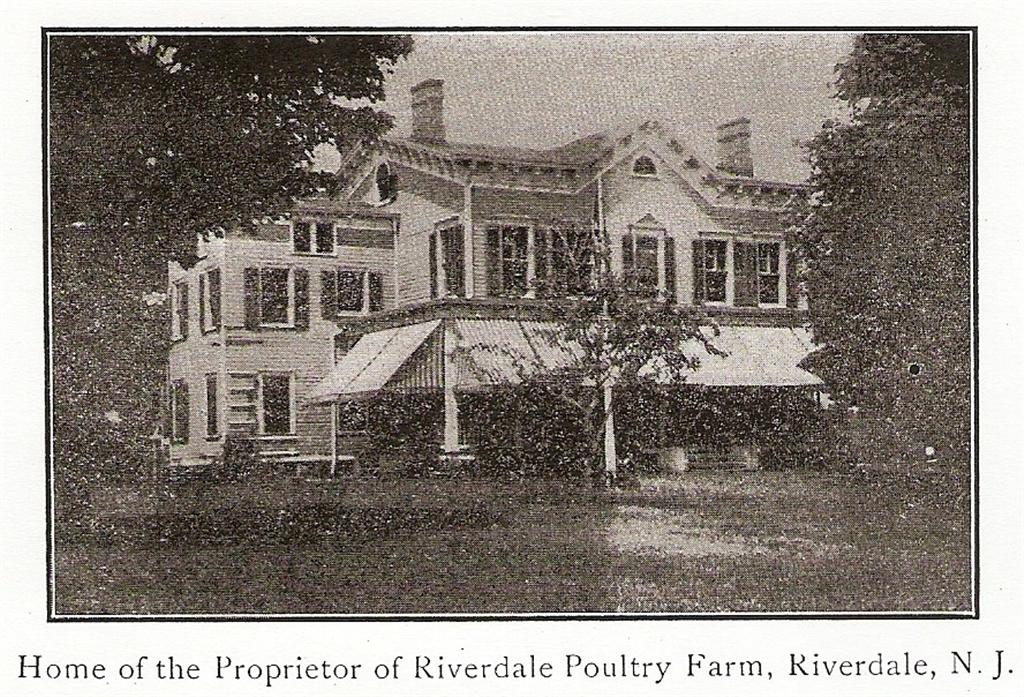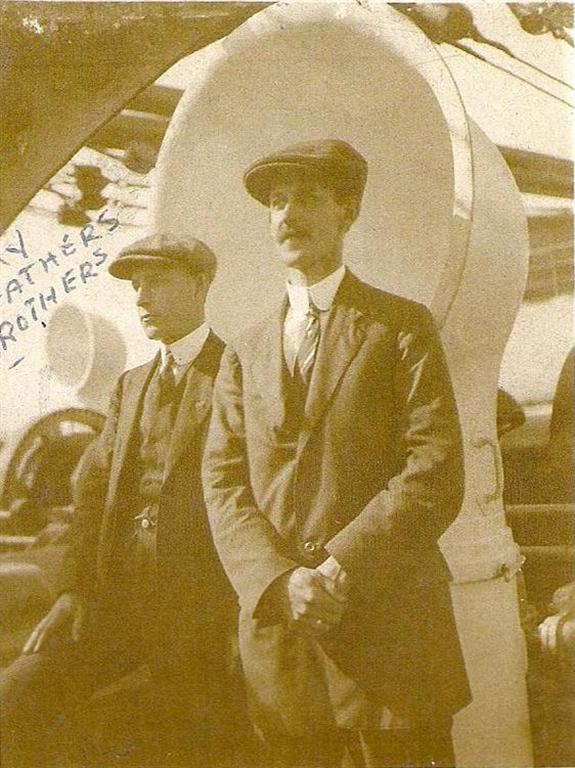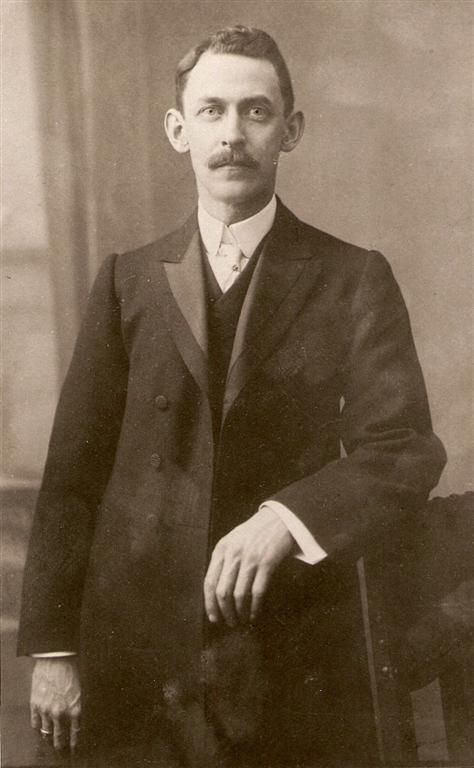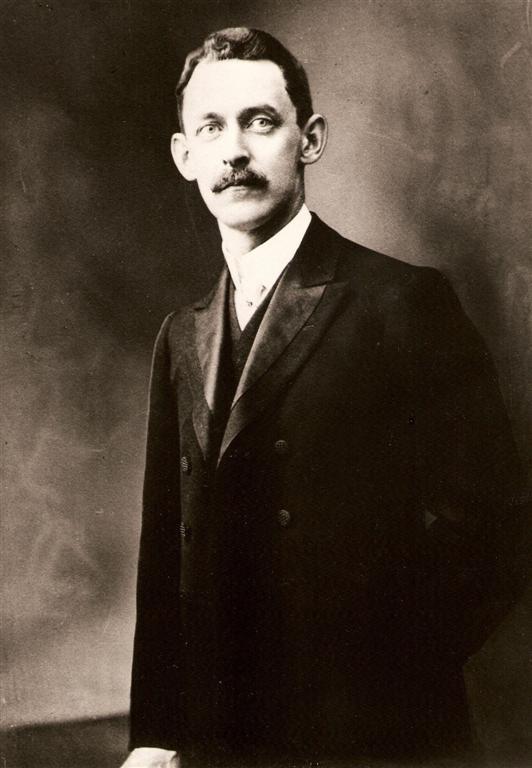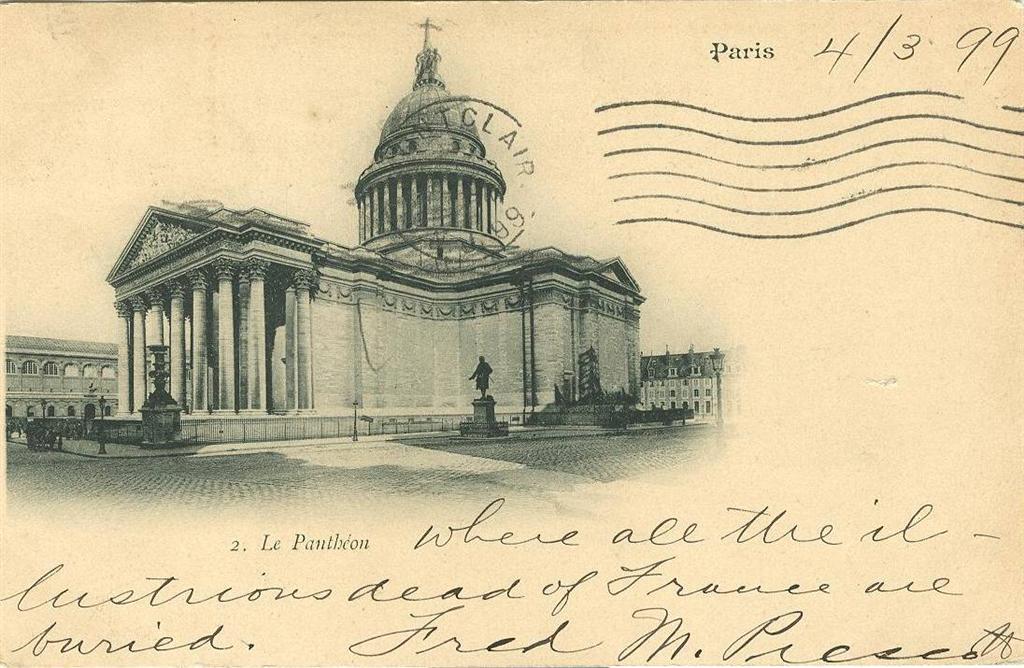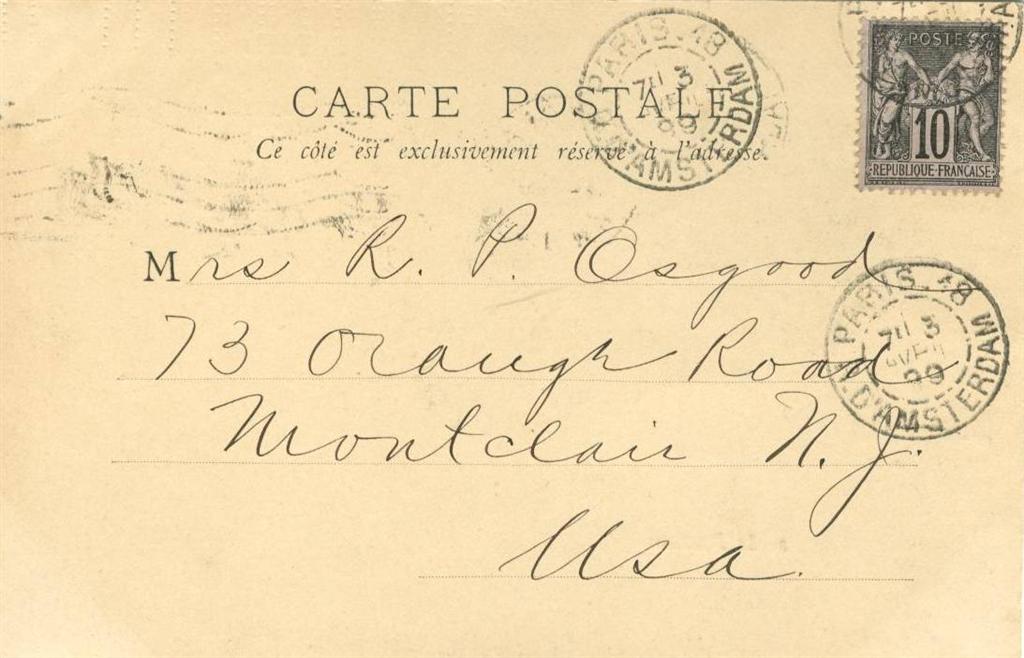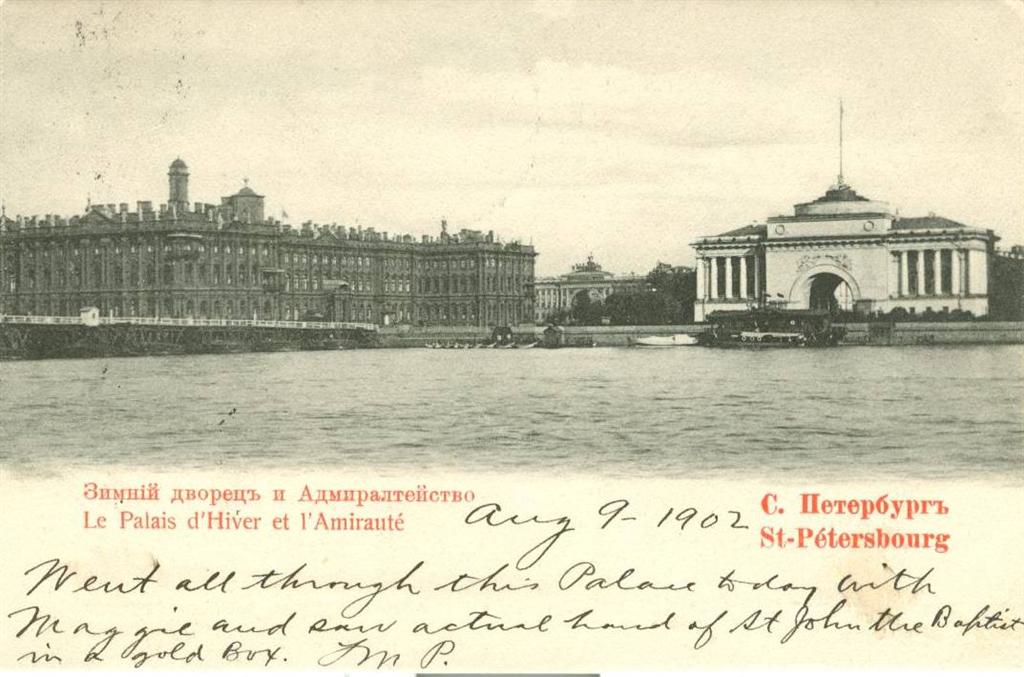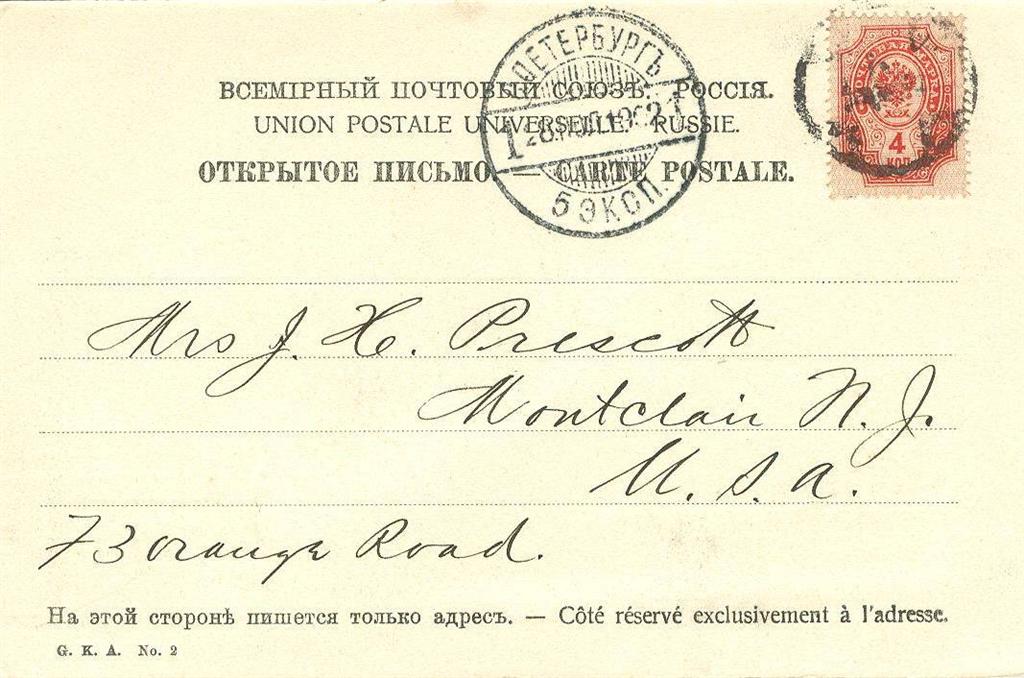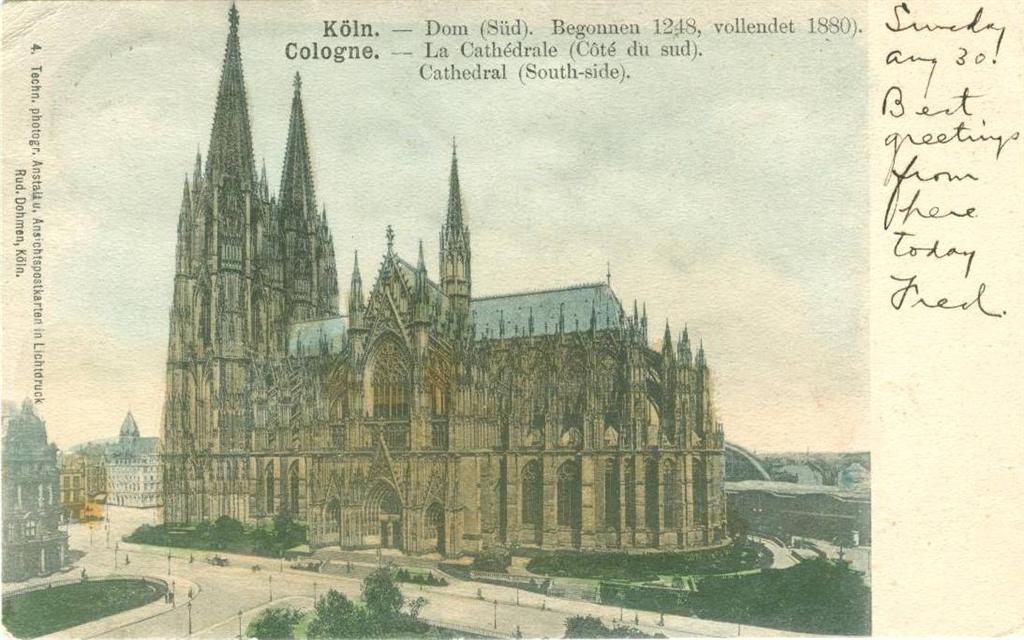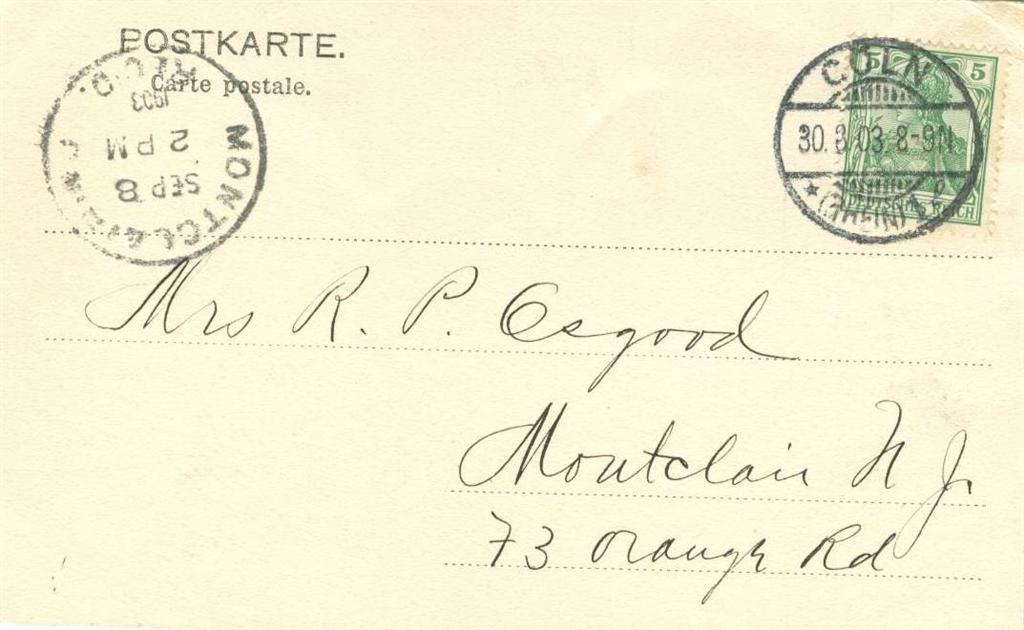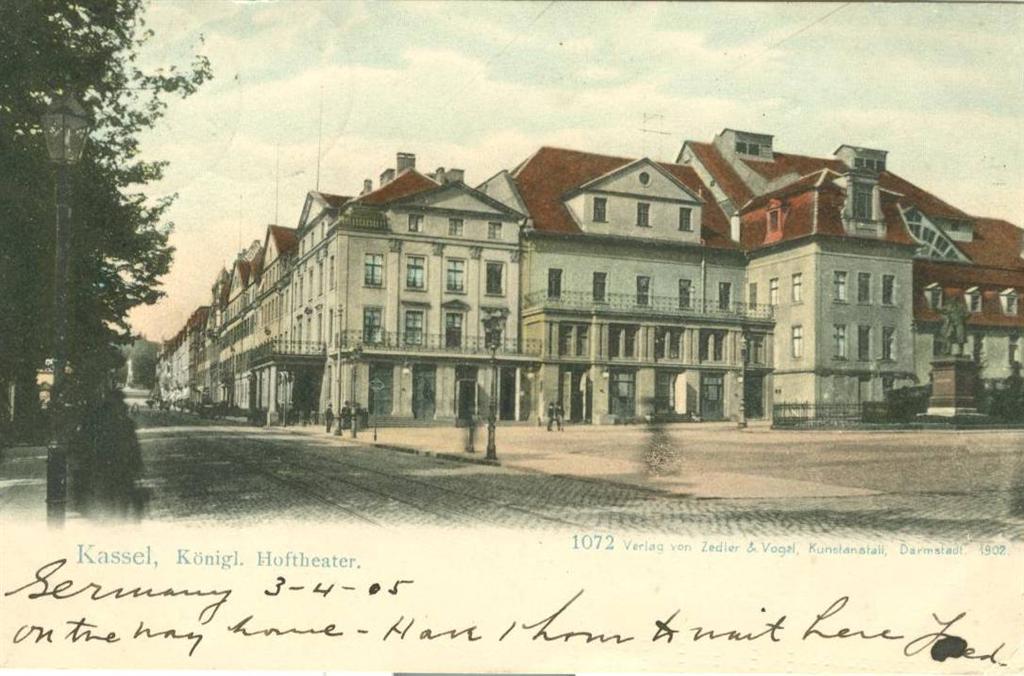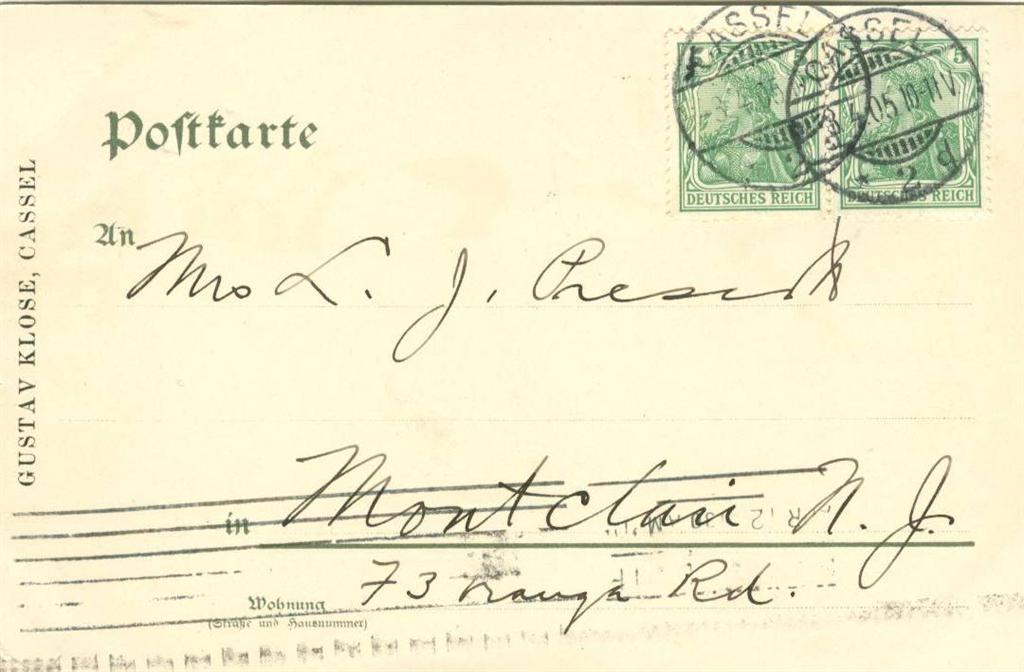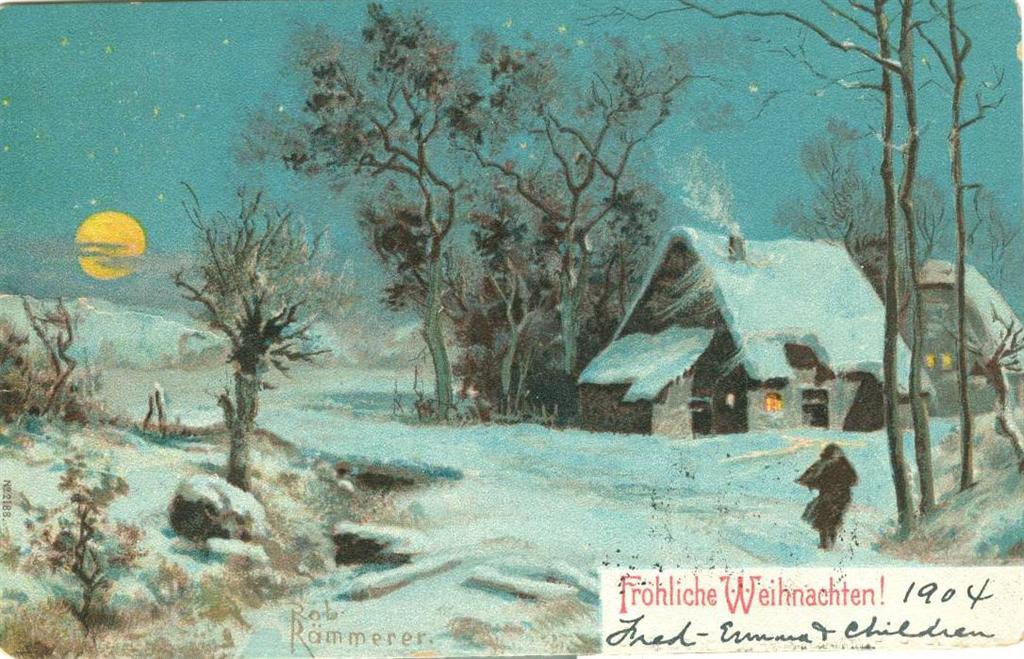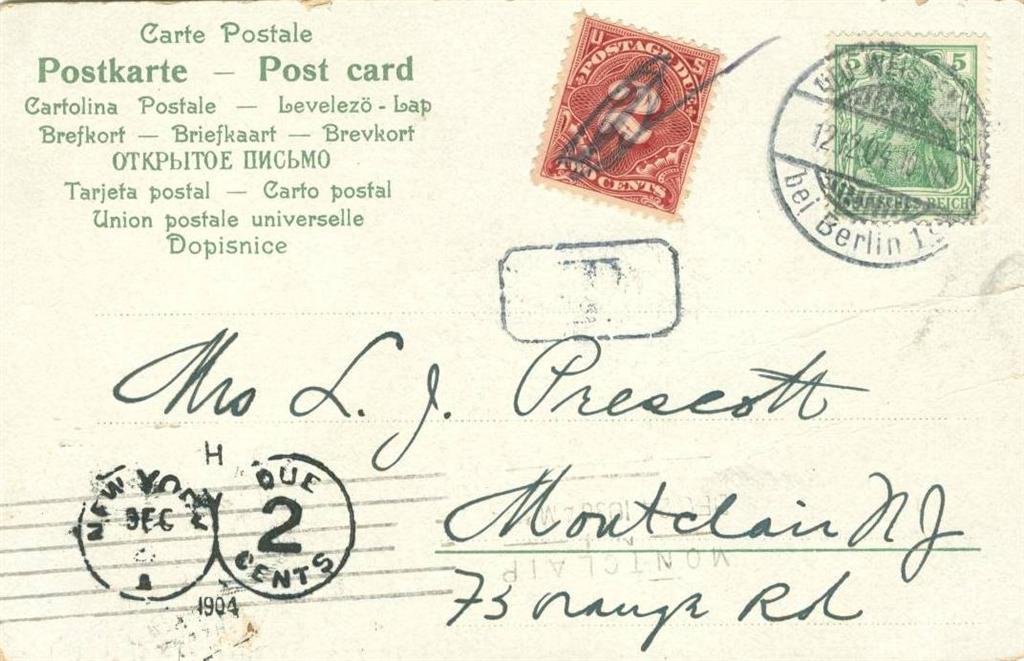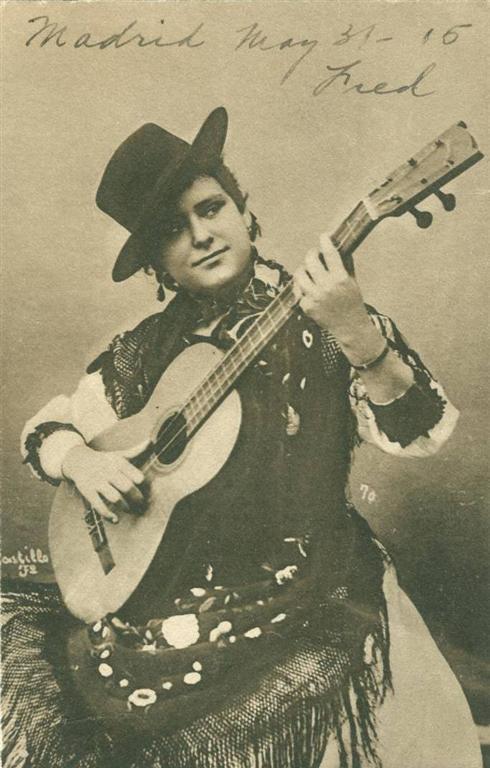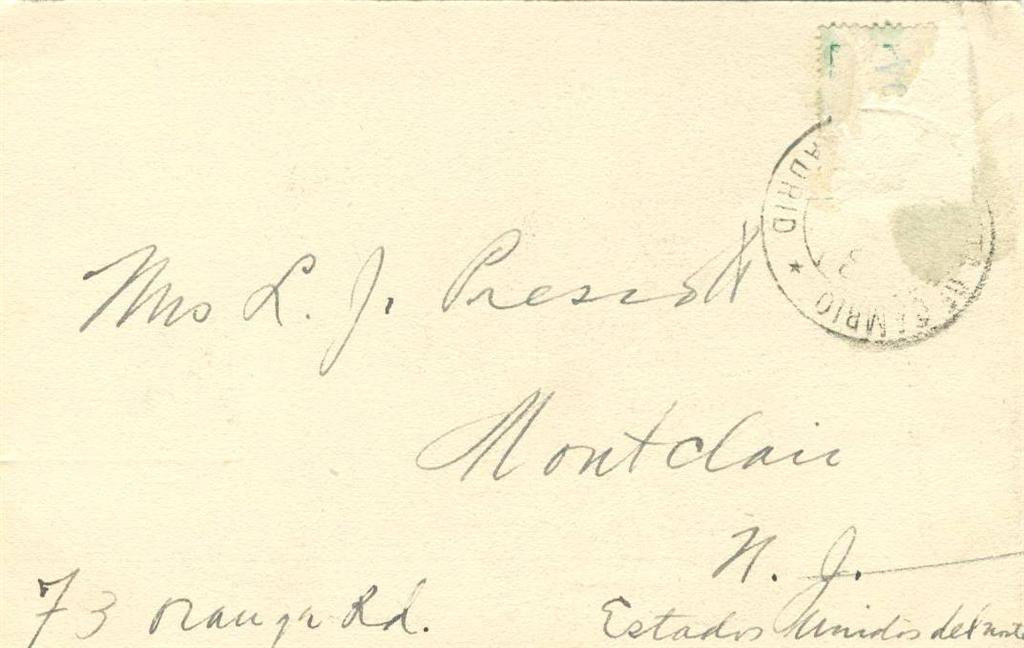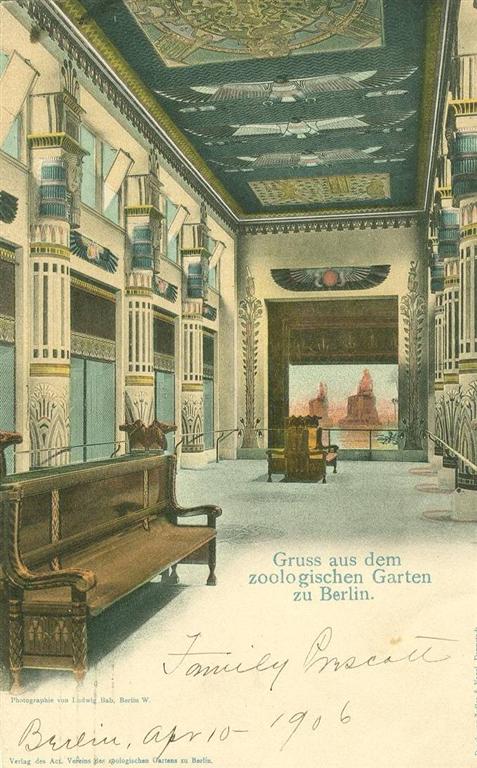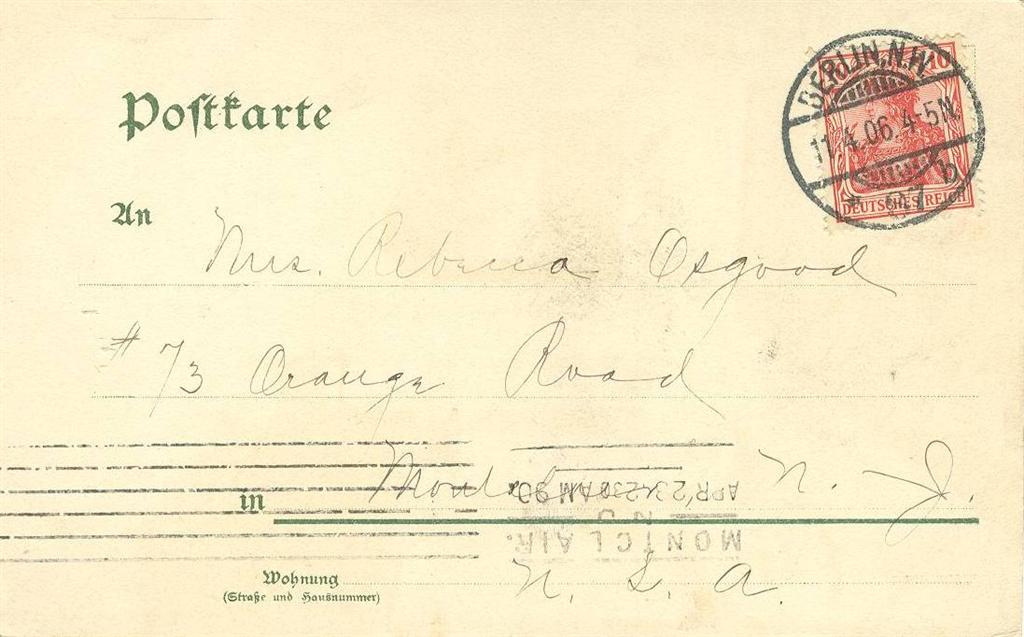PIONEERRESPOND
Frederick Marion PRESCOTT 1869 - 1923
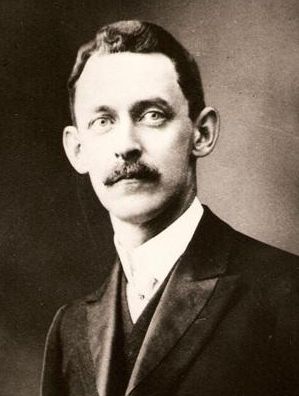 | |
| aka | Frederick Prescott, Fred Prescott, Frederick M. Prescott, Fred M. Prescott, F. M. Prescott, F. Prescott |
| nationality | |
| occupation | |
| birth | 19 Jan 1869, Boston, Suffolk, MA |
| baptism | |
| death | 30 July 1923, Paterson General Hospital, Paterson, Passaic, NJ |
| burial | Mount Hebron Cemetry, Essex, Montclair, NJ |
| marriage |
 Emma L. (=Louise?) RULON Emma L. (=Louise?) RULON b. 13 Feb 1869, Trenton, NJ |
| children |
|
PARENTS
| father | John Humphrey PRESCOTT b. 16 Oct 1841, Woburn, MA or Burlington, Barnstable, MA |
| mother | Lydia Jane (Jennie L.) OSGOOD b. 19 July 1846, Lowell, MA |
| marriage | they got married on 3 May 1866, Somerville, Middlesex, MA |
| children |
|
LIFE
Frederick Marion Prescott was born on 19 January 1869 in Boston, Suffolk, Massachusetts.
He was the son of John Humphrey Prescott, cabinetmaker, and Lydia Jane Osgood.
He was the eldest of 8 children.
In ca 1898 he married to Emma L. Rulon.
The couple had 3 children.
Prescott was selling Edison films:
7 Sept 1894: F. M. Prescott catalog (date 1894?) of films made by Thomas A. Edison
Thomas A. Edison Papers (taep@rci.rutgers.edu)
4 Dec 1897: gift (woodcuts) from Z. Arako and Co. to FMP (was FMP in Japan?)
Series one: Producers and sales agents active before 1900
F-002 Latest Edison Films for projecting
F-005 Catalogue of new films (1899)
F-028 99 model combined cinegraph and stereopticon, 1899
F-047 supplement No. 3, New Films, 20 Nov 1899
1897 (from FM Prescott catalog)
edison.rutgers.edu
Rutgers, the State University of New Jersey
The Films of Thomas Edison, Volume 7 (U.S. Historical Archive)
www.ushistoricalarchive.com/cds/edison7

In July 1898 Prescott travelled to Europe (or just Great Britain?) to promote phonograph products (source Andrews' EDISON CONNECTION, p. 35: letter from Edinburgh to The Phonoscope; Bayly/Kinnear p. 5)

In August/September 1898 Prescott returned to USA.
An exact date cannot be found, since his name does not occur on the ELLIS ISLAND passenger lists.
Was Prescott selling bicycles (see under Smoot: Joe Batten's description of the business situation)
see: The Wheelmen
Nile-(M) F. M. Prescott, New York, NY 1899

On 22 March 1899 with Orville D. LaDow to Europe (not on ELLIS ISLAND passenger lists)
In the Phonoscope of March 1899 F. M. Prescott writes about the COLUMBIA branch in Paris, which had just begun its European activities:
I called at the office of the COLUMBIA PHONOGRAPH COMPANY, Boulevard des Italiens, and found a large and well equipped establishment. Mr. Frank Dorian, its well-known manager, was away, but I had the pleasure of meeting Mr. Wake, his assistant. Their force is large and in keeping with the size of the plant. They are manufacturing a good grade of French records which is necessary in order to compete for the French trade.
(from: EMI, the first hundred years, p. 92-93)
By 1899 Frederick had bought a house at 73 Orange Road, Montclair, Essex, New Jersey and had moved in with his mother Lydia Jane Osgood, grandmother Rebecca P. Osgood and sister Norah.
(see David Prescott's letter, p. 3: 1900 = 1899; father [not correct; had died by then], mother and Norah)
On 3 April 1899 Prescott was in Paris, France, judging from a postcard of Le Panthéon in Paris, he sent to his family in Montclair, New Jersey. It reads: "This is where all the illustrious dead of France are buried." and is signed: Fred M. Prescott.
According to Bayly/Kinnear, Prescott was back in the USA on 11 May 1899.
BOSTON ARRIVALS
F. Prescott 1895
F. Prescott 1899
F. M. Prescott 1899
In August 1899 their son Frederick R. Prescott Jr. was born in Montclair, New Jersey.
In the New York Times of 3 September 1899 appeared the following announcement:
EDISON SUED FOR CONSPIRACY
Former Agent of the Inventor Brings Suit in New Jersey Court to Recover Damages.
Frederick M. Prescott, formerly head of the EDISON PHONOGRAPH AGENCY, 44 Broad Street, has brought suit in Chancery in New Jersey against Thomas A. Edison, the NATIONAL PHONOGRAPH COMPANY, William E. Gilmore, Charles E. Stevens, and others, for a "conspiracy to destroy" his business. The complaint makes the following allegations:
In 1894 Prescott began selling phonographs for export. His business grew rapidly, and in the autumn of 1897, William E. Gilmore, general manager of the EDISON PHONOGRAPH WORKS at West Orange, N. J. solicited him to purchase phonographs of that company and to quote the complaint, "offered to sell your orator at lower prices than any other customer, so that it was to the interest of your orator to cease bying phonographs of the United States Phonograph Company and to buy of the National Phonograph Company; that your orator was then bying about five thousand dollars' worth of phonographs monthly of the United States Phonograph Company and that it was to the interest of the National Phonograph Company and the Edison Phonograph Works to secure your orator's trade; for the reason that they would thereby increase their trade, inasmuch as the machines sold to your orator were by him resold in foreign countries, where the Edison Phonograph Works and the National Phonograph Company could not lawfully sell phonographs."
With liberal discounts allowed to him, Prescott says that he rapidly worked up an extensive foreign trade, and became one of the largest customers of the Edison Company. This success led, he says, to the conspiracy to force him out of business so that profits might be diverted to the NATIONAL PHONOGRAPH COMPANY.
According to the complaint, the first positive step was in the Spring of 1898. The complaint says that Charles E. Stevens who had previously .............................

In August [1899], Prescott went to Europe for a three months' trip. Troubles fell thick at once. When he landed he received a dispatch saying Stevens demanded a dissolution of the partnership by Sept. 1, and another that all discounts had been withdrawn.

Prescott hurried back, reached New York September 2 [1899], and the partnership was dissolved immediately.
While he [Prescott] was away, he alleges, Stevens copied his list of customers.
According to Bayly and Kinnear this happened in 1898 (page 5), but this should be corrected to 1899.
An account of this is also found in Read & Welch on pp. 141-142
Also on page 5
At about this time [.......] Frederick Prescott set up an Export business with his brother George, in the name of F. M. Prescott, with offices located at 44 Broad Street, New York.
Frederick Prescott had no brother called "George". Presumably his brother "John" was meant...
10 January 1900: Letter from L/G (Leo B. Cohn/Will Gaisberg) of The Gramophone Company Ltd. (London) to Theo. B. Birnbaum (Berlin):
We are interested to learn from your letter of the 8th. [January 1900] that Mr. [F. M.] Prescott has been in Berlin and shall like to hear what progress you make as to finding out his whereabouts and also to know if you are successful in obtaining an interview with him.
30 July 1900: Letter from William Barry Owen (Massachusetts) to The Gramophone Co. Ltd. (London)
p. 11:
re Prescott - I got your letter and could understand it in a general way but not in its effect.
I could not see how we were to be benefitted by letting him [= F. M. Prescott] have by far the best goods in America to sell in the world generally - exactly where we are selling - and especially as his inclination is to cut prices. Prescott is a smart man but an absolutely unreliable one and I am sure that I will make no alliance with him unless we have the whole business in our hands with our own men to know each and everything done - such as our own bookkeeper + correspondent. You can know that as I know Prescott. If he can be used safely I will use him but I will take no chances.

In May 1901 Prescott sailed for Germany together with John Daniel Smoot, Raymond Anton Gloetzner and Edwin Alan Pancoast.
On the UK Incoming Passenger lists we find arriving on 16 May 1901 at Liverpool, England, on board the SS 'New England" from Boston:
F. M. Prescott
Mrs. Prescott
Alfred (=Frederick) Prescott (infant)
E. A. Pancoast
Mrs. Pancoast
Mary Pancoast (infant) [should be: George Marshall Pancoast]
John Smoot
Raymond Glotzner
I [HS] have serious doubts about the correctness of the UK arrival date (16 May 1901), the name of the ship (SS "NEW ENGLAND") and the port of departure (Boston).
I suspect three different passenger lists of three different UK arrivals (Boston, Philadelphia and a third list) were accidentally bundled together and photographed as representing one single voyage:
(1) The Prescott party certainly did not travel on board of the SS "New England".
On the basis of information in the Boston Evening Transcript about departures of ocean steamers from Boston between 2 and 22 May 1901, it is clear that no ship by the name of SS "NEW ENGLAND" left Boston harbor before 22 May 1901. Both the Boston Evening Transcript and the Boston Daily Globe announce the departure of the SS "NEW ENGLAND" from Boston Harbor on 22 May 1901.
Prescott cum suis must have crossed the Atlantic on board of some other ship.
(2) Boston seems an unlikely port of departure.
(3) The so-called "Boston passenger list" shows three distinct types of handwriting.
It looks as if we have 3 different passenger lists:
- one set of papers for an arrival from Boston (SS "NEW ENGLAND)
- another (incomplete) set (of which pages 1 and 2 are missing) for an arrival from Philadelphia (ship's name unknown)
- a third (incomplete) passenger list (again ship's name unknown) where the point of embarkation has not been indicated (possibly New York) and of which the first 5 pages are missing.
(for this type of documents the first page is always crucial since it lists he name of the ship and the port of departure).
If we examine the handwriting on the third (= Prescott/Pancoast/Smoot/Glotzner) passenger list, there is only one conclusion possible: the reproduced passenger list is incomplete: pages 1-5 are missing (no images) and we have only images of pages 6-16 (images #19 and #25-34). All pages are undated and the point of embarkation has not been indicated on any of the shown pages [remarks made by Hugo Strötbaum].
In Fred Gaisberg's Diaries Part 6 (p. 180 Talking Machine Review, p. 1680) we find the following entry on Sunday 22 June, 1901:
During the journey [from Moscow to Nizhni Novgorod = Gorki] Labell told me some interesting stories concerning Raphoff's negotiations with Prescott (of ZONOPHONE).
One was very interesting. Raphoff had secured a capitalist in the way of a young officer who was to put up money to buy the ZONOPHONE monopoly for Russia.
So Raphoff telegraphed Prescott that all would meet in Paris to conclude the contract. So Raphoff, Skuridin and the capitalist started from Petersburg with a bountiful supply of vodka and sacuska. At Wilna the conductor awoke Raphoff and Skuridin, who were in drunken sleep, and told them their friend had jumped off the train. They both got off and searched clear up to [St.] Petersburg for him. It appears while they were sleeping, he viewed them with distrust and lost heart in the undertaking, so got off the train and returned to Petersburg.
So Prescott was fooled again.
In those same diaries Fred Gaisberg writes on Friday 3 July, 1901 (The Fred Gaisberg Diaries Part 6, p. 180, Talking Machine Review, p. 1685):
After a cup of coffee in a fine Cafe "Unter den Linden" [Berlin], I drove to Ritter Strasse, where I met Theodore Birnbaum. After a talk with him I visited Prescott's place, 72 Ritter Str., where I met Dan Smoot and Fred Prescott.
We have no (access to) passenger lists for voyages from the USA to Europe, so it is difficult to establish when Frederick's wife Emma joined her husband in Berlin.
But since their daughter Margaret Prescott was born in Berlin on 11 July 1902, Emma Prescott must have been in Berlin by November 1901 or at least near Fred.
On 9 Aug 1902 Fred sent a postcard from St. Petersburg (Russia) to his mother in America.
On it Prescott has written:
[We] went all through this Palace [= Le Palais d'Hiver et l'Amirauté] today with Maggie and saw actual hand of St John the Baptist in a gold box"
Apparently he was there with wife Emma and daughter Margaret ("Maggie").
ZONOPHONE had an agency in St. Petersburg since September 1901.
A number of letters found in the EMI archives clearly indicate that by late 1902 recording activities were going on in France.
On 20 November 1902 Arthur Clark wrote a letter (signed by the Administrateur Délégué of the Compagnie Française du Gramophone in Paris) to W. Barry Owen in London:
I find that the ZONOPHONE people have made an arrangement with the firm of C.&.J. Ullmann of Paris for the representation of the ZONOPHONE in France.
At the present time Prescott's recorders are at work making records here.
They approach the very best people, and have succeeded in getting a number of them.
Prescott could not have placed his business in better hands, as Ullmann's House is about like Thibouville-Lamy & Co., which I think you know.
They have all the money necessary to push the business, and are splendid businessmen, having an established trade throughout France.
They seem to be paying good Artistes almost any price, and as I have heard some of the late records taken by Prescott's people both in London and in Paris, I am prepared to believe that now we will be up against interesting competition for the first time.
On 11 July 1903 Prescott resigned from the INTERNATIONAL ZONOPHONE COMPANY, but remained a major shareholder.
Prescott's advertisement (in English) can be found on p. 684 of, a series of articles by Frank Andrews
On p. 442 of the Phonographische Zeitschrift of 19 August 1903 appeared the following announcement from Prescott (reproduced on p. 251 of Woessner Teil 4):
Ich habe soeben eine neue Gesellschaft gegründet, welcher ein mehr wie drei mal grösseres Barkapital zur Verfügung steht als seinerzeit der International Zonophone Company.
Die Aufnahme-Ingenieure welche mit mir zusammen in der International Zonophone Company waren [Dan Smoot, Edwin Pancoast, Raymond Glötzner and Hans Glötzner], sowie ein grösserer Teil der leitenden Angestellten haben nach meiner Resignation ihre Stellung in dieser Gesellschaft niedergelegt, um mir in die neugegründete Gesellschaft zu folgen. Eine neue Fabrik mit verbesserten Maschinen ist .... nunmehr beinahe fertig.
[October 1903: a similar English version is reproduced on p. 684 of F. Andrews' series of articles A Fonotipia Fragmenta in the Talking Machine Review of June 1976 (No. 40, part 1)]
[Reproduce original advertisement or copy the text into this manuscript]
In the Zeitschrift für Instrumentenbau (p. 141 (14 November 1903):
In das Berliner Handelsregister wurde eingetragen: Internationale Talking Machine Company mit beschränkter Haftung...........
Kaufmann Frederic (sic) M. Prescott.........................

On 30 April 1904 Prescott's wife Emma Rulon-Prescott leaves Germany (with their children Frederick and Margaret) to arrive in New York on 14 May 1904.
Letter 24 August 1904:
. that Alfred Michaelis has fixed up with Prescott, and claims he will do an enormous South American shipping trade.
(see also: A Fonotipia Fragmenta, p. 5)
On 12 December 1904 Fred sent a Christmas card with "Fröhliche Weihnachten!" and signed "Fred, Emma and children" [= Frederick Jr. and Margaret] to his mother in
On 31 March 1905 Fred sent a postcard (Rode on lake today.) from Lugano, Italy to
On 3 April (or 4 March?) Frederick sent a postcard from Kassel (Königl. Hoftheater):
On the way home - Have 1 hour to wait here.
On 31 May 1905 Prescott sent a postcard from Madrid to his mother in.
On 22 November 1905 his son David G. Prescott was born in Berlin.
In December 1905 Prescott's children sent a Christmas postcard from Berlin-Weissensee to their cousin Master Prescott Braun, the son of Prescotts sister, Norah (27/12/1905, New York).
On it the following text: "Your little cousins wish you and your mamma a very merry Xmas".
Signed: "Frederick, Margaret and David".
Article in the Phonographische Zeitschrift of 11 January 1906 (7/2/24) with the heading:
Aus der Berliner Sprechmaschinen-Industrie.
Wir hatten kürzlich Gelegenheit, mit Herrn Prescott, dem Direktor der INTERNATIONAL TALKING MACHINE Co., welche in [Berlin-] Weissensee die ODEON-Platten fabriziert, eingehend über die augenblickliche Geschäftslage zu sprechen. Herr Prescott teilte uns mit, dass gegenüber dem vorigen Jahre sich der Umsatz in den letzten Monaten auf das Doppelte belaufen hätte. Trotzdem durch einen Umbau die Presserei um 1/3 vergrössert wurde, musste doch in der letzten Zeit in zwei Schichten gearbeitet werden, indem die Hälfte der neunzig Presser von morgens 6 Uhr bis nachtmittags 3 Uhr und die andere Hälfte von nachmittags 3 Uhr bis nachts 12 Uhr arbeitete. Welche grossen Quantitäten in diesem Betriebe hergestellt werden können, ist ohne weiteres klar, es kommt aber noch hinzu, dass seit einigen Jahren [a typo for: Monaten] auch in Wien [Schwechat] und London [Hertford] Pressereien für ODEON-Platten eingerichtet sind. In Wien werden speziell die ungarischen, böhmischen, türkischen und griechischen Platten gepresst und in London ist der Betrieb schon so gross, dass täglich 2000 englische Platten fertiggestellt werden. Durch die Einrichtung dieser beiden Filialfabriken ist die Weissenseer Fabrik so weit entlastet worden, dass nunmehr an eine energische Behandlung des deutschen Geschäftes geschritten werden kann, welches bisher gegenüber dem auswärtigen ein wenig vernachlässigt worden ist. Seit kurzem hat die Gesellschaft Herrn Brübach, der während der letzten sieben Jahre bei der Grammophon Gesellschaft tätig gewesen ist, für die Forcierung des Deutschen Geschäftes angestellt. Es werden gegenwärtig täglich eine grosse Anzahl neuer deutscher Aufnahmen hergestellt, und in kurzem kommt ein sehr vervollständigtes deutsches Repertoir heraus. Auch wird demnächtst in de Ritterstrasse ein Lokal für das deutsche Verkaufsgeschäft der Odeon-Platten sowohl als für Aufnahmen eingerichtet.
Von ganz besonderen Interesse ist das Verhältnis der INTERNATIONAL TALKING MACHINE Co. zu der Gesellschaft FONOTIPIA Mailand. Diese Gesellschaft, welche in engster Fühlung mit den allerersten italienischen Sängern steht, selbst aber über einen technischen Betrieb nicht verfügt, hat mit der Weissenseer Gesellschaft [ODEON] ein Abkommen getroffen, nach welchem diese für Fonotipia die Aufnahmen ihrer Sänger und die Herstellung der Platten zu bewerkstelligen hat. Gleichzeitig hat die Weissenseer Gesellschaft auch den Allein-Verkauf der italienischen FONOTIPIA-Platten für Deutschland.
Die jüngsten Vorgänge in Amerika, welche wir in unserer letzten Nummer besprochen haben, veranlassten eingehende Aüsserungen des Herrn Prescott über die dort eingeführten Preis-Reduktionen für Platten. Herr Prescott ist der Ansicht, dass in Deutschland nicht die geringste Aussicht vorhanden ist, dass eine der grossen Platten-Fabriken dem Amerikanischen Beispiel der Preisreduktion folgen wird und zwar aus dem Grunde, weil die europäischen Verhältnisse ganz anders liegen als die amerikanischen. Man macht hier viel grössere Ansprüche in Bezug auf die Qualität der Aufnahmen, wie auch auf die Vielseitigkeit des Repertoirs. Infolgedessen ist es für die Plattenfabrikanten notwendig, Aufnahmetechniker auf Reisen zu schicken, die Kosten der Aufnahmen werden infolgedessen und infolge der höheren Honorare der Künstler bedeutend grösser und der Absatz der von den einzelnen Matrizen hergestellten Platten ist bei weitem geringer als in Amerika. So beträgt schon jetzt das Repertoir der ODEON-Platten annäherend 11.000 Piècen, während deie weit älteren grossen amerikanischen Firmen meist nur über ein Repertoir von einigen Tausend Platten verfügen.
Übrigens ist Herr Prescott vollständig überzeugt, dass der neue Blumentrichter die alte Form vollständig verdrängen wird, denn der Ton wird vergrössert und verschönert, und das Interesse für die Neuheit ist in den Händlerkreisen ausserordentlich gross. Herr Prescott konnte uns bei dieser Gelegenheit ein Kompliment über die Wirkung der Inserate in unserer Zeitschrift machen, indem er in keiner anderen Zeitschrift inseriert und konstatiert hatte, dass das erste Inserat des Blumentrichters, welches die ODEON-Gesellschaft in der Phonographischen Zeitschrift veröffentlicht hatte, viele Hunderte von Anfragen gebracht hatte, wodurch die Erwartungen des Herrn Prescott bei weitem übertroffen wurden.
confirmed by 4 December 1906 : Letter from Vogel (Vienna) to Birnbaum (London). Under the heading Austria and Vienna
......................................................
The ODEON has now constantly a recorder [machine or expert?] here [probably J. D. Smoot] and presses the records half an hour from Vienna [in Schwechat], so that she can fill the market long before we receive the same.
About closing of Gramcos Vienna Branch in 1907 see Letters 6/12/1906, 11/12/1906, 12/12/1906 and possibly more.
Article in the Phonographische Zeitschrift of 8 February 1906 (7/6/1) on American Gramophone factories in Germany mentioning James P. Bradt (Columbia Phonograph Company), F. M. Prescott (Int. Talking Machine Co.-Weissensee) and N. M. Rodkinson (Direktor Deutsche Grammophon Akt. Ges. and Int. Zonophone Company). Picture of FMP.
On 10 April 1906 Prescott sends a postcard (stamped 11/4/06) from Berlin to his grandmother Mrs. Rebecca Parker Osgood, Lydia Jane Osgoods mother, in Montclair, New Jersey.
Between 24th April and 31st July 1906 F. M. Prescott sold his majority shareholding in his International Talking Machine Co m.b.H. (ODEON) to .......
(F. Andrews, A F. F., p. 16-17)
But see als letter of 19 Oct 1909 (!!!) about this same question (Muir file)
In the Phonographische Zeitschrift of 23 August 1906 (7/34/727-728) appeared the following announcement:
Fonotipia und Odeon.
Mit lebhaftem Bedauern müssen wir die Mitteilung machen, dass der verdiente Begründer und bisherige Leiter der Fonotipia-Gesellschaft in Mailand, Herr Alfred Michaelis, seit einigen Monaten krank ist und voraussichtlich noch längere Zeit sich nicht dem Geschäft wird widmen können.
Infolgedessen ist der bisherige Leiter der Firma Ullman in London, welche in England die Odeon-Platten einführte [Emil Rink], zum Direktor des Mailänder Fonotipia-Hauses ernannt werden. Die Firma Ullmann wird in Zukunft nicht mehr mit dem Vertriebe der Odeon-Fonotipia-Platten beschäftigen, sondern in Zukunft wird die durch eine bedeutende Kapital-Vergrösserung umgewandelte Firma The Russell Hunting Record Co., 14 Hamsell Str. London E.C. unter Leitung des Herrn F. M. Prescott, die Odeon und Fonotipia Platten in England vertreiben und, wie der Phono Trader berichtet, werden in Zukunft alle englischen Odeon-Platten von dieser Firma in London selbst gepresst werden.
And in the Phonographische Zeitschrift of 6 September 1906 (7/36/789 or 791):
ODEON-PLATTEN IN ENGLAND
Wir hatten aus einer Mitteilung einer englischen Fachzeitschrift entnommen und in unserer letzten Nummer mitgeteilt, dass die Oberleitung der die Odeon-Platten in England fabrizierenden Firma The Russell Hunting Record Co. Ltd., Herr F. M. Prescott führt.
Hierzu wird uns von Herrn Prescott mitgeteilt, dass Herr Louis Sterling, der sehr bekannte Begründer der Russell Hunting Record Co., welcher seit Gründung der Gesellschaft der Managing Director derselben ist, auch weiterhin Managing Director bleiben wird und beide Abteilungen, sowohl die Walzenabteilung, als auch die Odeon- und Fonotipia-Abteilung leiten wird.
Herr Prescott bleibt in Berlin in der Position, welche er seit Gründung der Odeongesellschaft gehabt hat, für eine vor der Hand noch unbestimmte Zeit.
19 September1906: Letter Rodkinson to Birnbaum on Goldstein (Prescott mentioned)
On 28 September 1906 Kenneth Muir (Milan) wrote in a letter to Theodore Birnbaum in London):
GLOETZNER - Hans Gloetzner arrived here [in Milan] shortly after my arrival and I have had an opportunity of having a long conversation with him. I mentioned casually that our Company [= The Gramophone Company] was short of Recording Experts owing to the ever increasing volume of business and that at least two more would be required. He at once pricked up his ears at this and said it was a pity he had not been told this by me two days earlier when he signed a new contract with Prescott at Berlin.
I told him that I was only speaking in general terms and was not thinking specially of him but that I thought that of the ODEON recording experts he and his brother [Raymond] would be the only ones who our Company would consider favourably. He informed me that the contract he has just made is for a salary of 250 Marks a week and that he was not very satisfied with it and also that he has a considerable amount of friction with Prescott of whom he expressed himself in very uncomplimentary terms. He also seems to have a bad opinion of Erlanger and thinks that the action taken with regard to Michaelis was very shabby.
He expressed a fear that, if he entered our Company, the reason for taking him would be to deprive the ODEON of their best experts and that, if this Company [ODEON] were to be ruined, the object of The Gramophone Company in taking him would have been accomplished and there would be no further use for him.
I said that, if he really thought that, he ought to give our Company a wide berth but that nothing was further from the truth and that he must not allow himself to be prejudiced because he is in a competitive Company not likely to regard their competitors with an excess of admiration. He stated his unwillingness to break a contract unless he had some serious justification for doing so and that our Company would certainly have a poor opinion of him, were he to do so, to which I fully agreed and said that we would certainly not do anything to induce him to take such a step, but that in the event of his having serious cause it might be of interest to him to know that here would be a chance of our Company considering him favourably as a recording expert.
He further volunteered the remark that if his brother [Raymond] were to come over with him, he [Raymond] would probably not wish to be employed as an expert but would prefer a good billet at the factory, but that this would be difficult in view of his hostility to Berliner.
From the whole conversation I received the impression that the Gloetzners are far from satisfied with their present positions and would infinitely prefer to be with us.
I also received the impression that their Company is not nearly so prosperous as we suppose.
He told me that they were now going to make more [Alessandro] Bonci records and that they wish to make as many as possible now, as they do not think Bonci's voice will hold out for long.
He also told me that radical measures are being taken to cut down the management charges at Milan, that the Board have ordered the advertising charges to be heavily reduced and no cash advances on account of royalty to be paid to artistes on the conclusion of contracts.
Titta Ruffo had certain negotiations with the Fonotipia before signing his contract with us and asked for a cash advance of 2000 Francs which was refused, although they knew I was also in treaty with him. As there is only one opinion with regard to the great value of Titta Ruffo here this action is eloquent and suggests a distinct shortness of cash.
The Fonotipia is quite inactive here at present. In September they have issued no new records to make weight against three good supplements issued by us.
As you know many of their staff were formally employed in our office and frequently meet and chat with our clerks.
Immediately after the judgement [what judgement?] there was great jubilation among them, but this has now given way to a general spirit of depression and the fear that their Company will fall into our hands in the same way as the Zonophone Company.
Our sales here [at Milan] are picking up wonderfully and I think our October sales will be quite normal.
Frank Andrews in A Fonitipia Fragmenta, p. 18:
In August 1906 G. Ricordi & Co won a suit against THE GRAMOPHONE COMPANY (Italy) Ltd., wherein it was held that all records of copyrighted works were an infringement of such copyright and that royalties must be paid to the owners of such copyrighted works.
See also letter of 15 December 1906 (FMP file)
On 19 Oct 1909 Will Gaisberg (Laboratory) writes to his brother Fred W. Gaisberg in Milan:
I suppose you know by this time the further developments which have taken place since [Kenneth] Muir has joined the competition [= FONOTIPIA].
I mean I believe Ricordi is now trying to make a definite effort to bring a suit of damages against us for back royalties. They could never do this before on account of being unable to ascertain how they could sue us or on what grounds they could sue, This was, I believe, a law question. It seems Muir has been able to show them how they could put a possible and definite plan.
...................
The question is, we have put the Italian business into the hands of Puccio, and at the present we are not in business in Italy. Whether this is enough to stop Ricordi's action against us in Italy I do not know.
[from Muir correspondence]

On 3 November 1906 Frederick M. Prescott leaves Germany (Bremen) for the first time since he came to Germany in 1901 on board of the SS "Friedrich der Grosse" with his son Friedrich [= Frederick] and arrives in New York on 14 November 1906.
While in America he was interviewed by the American trade journal The Talking Machine World.
The interview was published in The Talking Machine World of 15 December 1906 under the title:
Prescott's Interesting Views.
The President of the International Talking Machine Co. Says There Are No Trade Restrictions in Europe - Disc Prices Abroad - The World's Business Divided - Talent Better Paid in Europe Than Here - New Copyright Bill Will Help Europeans - Royalty in Europe Not Felt.
------------------------------------------------------
Not only is F. M. Prescott, president and general manager of the International Talking Machine Co., Berlin, Germany, one of the most conspicuous men of the talking machine business in any quarter of the globe, but he is also an interesting and impressive conversationalist on trade topics. Shortly after his arrival in New York from abroad, on the "Friedrich der Grosse", of the North German Lloyd line, direct from Bremen, his first trip home in five years, "to eat his Thanksgiving [fourth Thursday in November] turkey and see his friends", as he expressed it, he chatted informally with The [Talking Machine] World as follows:
"We are working under no restrictions in Europe; that is to say, there are no fundamental patents, only constructive patents. All you need is a knowledge of the process of manufacturing, with sufficient capital, and then you can go ahead entirely free to produce and dispose of your output. The only important cylinder records on the Continent are those of Edison, the Columbia and Pathé Frères in France, the local makers having long since ceased to exist. This, however, is not true of Great Britain, where the cylinder business is fully equal, if not more important than the disc business, the Russell Hunting Co., Ltd., the Edison Bell, Ltd., being the principal local manufacturers. Fully seven-eighths of the product are discs. There are about 20 manufacturers of disc records in Germany alone, but the large majority are small concerns, and not heavily capitalized, and the quality of work is inferior. We get much better prices than are obtained in the United States. For example, four sizes are made, 7 inch, that sells for 60 cents; 10-inch, for $1.20; 12-inch, for $1.80; 14-inch, for $2.40, as turned out by the Gramophone & Typewriter, Ltd., and our company, on which there is a uniform trade discount of 33 1/3 per cent. for domestic sales, and 40 per cent. for export.
The trade in the United States is not what I consider commercially profitable, in view of the prices prevailing, unless the turnover is tremendous. That is to say, it has got down to the level of a staple line, in which the margin has been cut to the bone - down to hard pan.
Were it not for the Berliner patent my company would manufacture its goods here and get the same prices we command in any part of the globe, strictly on quality and repertoire.
"You know," continued Mr. Prescott, with earnestness, "the world, in so far as the sale of their product is concerned,has been divided between the Gramophone & Typewriter, Ltd. of London, England, and the Victor Talking Machine Co., Camden, N. J., the latter controlling South, Central and North America, and that part of Asia not included in the British colonies. The Edison, Columbia and Zonophone are also well-known in these countries. We, however, operate everywhere, and with a catalogue of 14.000 titles do a splendid business at our prices. I have always believed that there will always be a sale for records at a good price, hence our aim of high quality. Now, we have been in business only three years, and a catalogue of this size is no small accumulation, when it is considered that the European Gramophone catalogue represents 23,000 selections - a fair comparison. You see, the catalogue must be fully developed for each country in which you do business in order to command sales.
"The 'talent' here is not nearly so well paid as with us. For instance, the prices of the recording laboratories in America range from $2, the lowest, to the average of $5, sometimes reaching $10. On the other hand, our figures are nearer $20 to $25, and not infrequently running up to $200 per song, and that not for the so-called celebrity artists, either.
In Egypt I paid an Arab 40,000 francs ($8,000) to sing 40 songs - $200 apiece. We sell quantities of records in Egypt, Arabia, Turkey and Asiatic territory. The religious feeling is extremely strong in these countries, and the Moslems are zealous worshippers, so that records of extracts from the Koran, and of their hymns and holy pieces sell freely. Sheet music is unknown in these countries, hence the talking machine is therefore regarded with much favor.
The matter of copyright is bothering us little, if any. Our company has already arranged with the leading publishers in Europe, some of which are exclusive arrangements, and the rest only the right to use the same as any other parties. We are also fully protected on all the Italian classical music owned by the house of G. Ricordi, of Milan, Italy. This house is strongly identified with the Societa Italiana di Fonotipia, Milan, which is a sister company of our Odeon Co., in Berlin, and which Fonotipia Company control the Ricordi rights for the world.
"In the event of the passage of the new copyright bill in the United States we would, to a certain extent, have rights on the European classical music in the United States, which the local companies here have not yet acquired. Besides the copyright feature, we have also tied up with contracts for a long term of years, or either for their natural life, many of the best artists of Europe who sing in Covent Garden, London; Grand Opera, Paris; The Scala, in Milan, and Royal Operas in Berlin, Vienna and other European capitals.
The copyright royalty is already in effect in Europe, being in France and Italy. The manufacturing companies do not feel this, as it is small, usually 5 per cent. on the list price, which amounts to about 3 cents per record, which has been added to the retail price, so that the public really pay for it. Suits are now often before the courts in Belgium, Hungary, Austria, Germany and Spain, and we expect favorable decisions in all of these countries within two or three years, if not before. A talking machine record is certainly a form of music, no matter how it may be argued to the contrary. Berliner acknowledged this in the selection of the Greek word 'gramophone', 'written sound'. The reproductions of sound appertain to the ear, and this in turn effects the feelings or soul, if you please. I believe Europe is further advanced in many respects in the talking machine line. This is because there is not so much patent restriction, and the competition is much freer to develop and make improvements than in this country".
By the time this article was published - on 15 December 1906 - Prescott was back in Europe again.

On 1 December 1906 - immediately after Thanksgiving - he had boarded the SS "Patricia" of the Hamburg-America Line bound for Europe.
In the Talking Machine Review 56-57, Vol. 8 of February-April 1979 (pp 1481-1482) appeared a summary of this article by Frank Andrews.under the heading: Fonotipia.
PhZ 7/20/440 (17 May 1906):
Arabische Aufnahmen Kairo Scheik (10.000 Francs) (Sheikh Salama Hegazi)
(two-year contract with Blumenthal for 1800 pounds expires per March 1908; letter 26 Oct 1906 + letter 27 Nov 1906, p. 6)
Salami may have been recorded by Odeon ca. March 1906...
In the Phonographische Zeitschrift of 21 March 1907 (PhZ 8/12/323) the following announcement was made:
In der Geschäftsleitung der International Talking Machine Co. m. b. H. [Berlin] Weissensee ist vor einigen Tagen ein Direktionswechsel eingetreten.
Sowohl der Gründer der Gesellschaft, Herr F. M. Prescott, als auch der seit etwa einem Jahre dort tätige Direktor Herr Leo B. Cohn sind ausgetreten, nachdem schon Herr Prescott vor längerer Zeit seine kapitalistische Beteiligung an der Gesellschaft, welche den grössten Teil der Geschäftsanteile Talking Machine Co. besitzt, abgetreten hatte.
Herr Prescott geht nach Amerika zurück, nachdem er nunmehr seit ca. fünf Jahren in Deutschland gelebt hat und einer der tatkräftigsten Förderer der deutschen Platten-Industrie gewesen ist.
Um so mehr darf man das Fortgehen des Herrn Prescott bedauern, als alle, die geschäftlich mit ihm in Berührung getreten sind, wissen, dass er ein überaus liebenswürdiger Charakter ist, der mit hoher geschäftlicher Intelligenz die Gabe verband, mit allen, mit welchen er geschäftlich zu tun hatte, auf gutem Fusse zu stehen.
Die Odeon-Gesellschaft hat sich unter seiner Leitung zu einem der einträglichsten Unternehmen der deutschen Sprechmaschinen-Industrie ausgebildet.
At the same time the following article was published in the German trade journal "die Sprechmaschine" of March 1907 (14/314):
F. M. Prescott, der Gründer der Internationalen Zonophon Compagnie, der diese Gesellschaft im Jahre 1901 nach Deutschland brachte, gehörte zu den Pionieren der Branche.
Seine Interessen bezogen sich allerdings nur auf Platten.
Als im Jahre 1904 [see p. 30, Bayly/Kinnear] sein eigenes Unternehmen gegen seinen Willen auf die Grammophon-Gesellschaft überging, begründete er die International Talking Machine Co., die Fabrikantin der Odeon-Platten.
Darüber hinaus organisierte Herr Prescott eine besondere Gesellschaft in London [= The International Phonograph & Indestructible Record Co. Ltd in Liverpool?] und die Fonotipia Co. in Mailand.
In den letzten Jahren ist es nach anfänglichen Misserfolgen Herrn Prescott gelungen ein grosses Vermögen zu erwerben, und er kehrt befriedigt in seine Heimat New York zurück.
Erst durch diesen Mann wurde es offenbar, dass die Fabrikation der Platten kein Patent sei, und ihm müssen alle neueren Plattenfabriken für die Anregung der Idee dankbar sein.
Herr Prescott hat sich in Deutschland jeder Zeit der weitesten Sympathien der gesamten Branche erfreut, und wir sehen ihn mit Bedauern Deutschland und den europäischen Boden verlassen.
On 9 April 1907 Prescott, together with wife and 3 children, returns to the USA for good.
He arrived in New York on 24 April 1907.
(see also AFF, p. 21)

Friedrich Prescott (38y)
+ ...... Prescott (38y)
+ ...... Prescott (6y)
+ ...... Prescott (4y)
+ ...... Prescott (11m)
dep.: Cuxhaven, 9 Apr 1907
arr.: New York, 24 Apr 1907
In June 1906 Leo B. Cohn joined the International Talking Machine Co. as Director (PhZ 7/25/537)
In the PhZ 8/12/323 (21 March 1907) it is announced he left the ITMC.
In April 1907 it is announced that he a few days ago Cohn had joined the DGAG (dS -/15/350)
PhZ 7/25/538 (6/4/1907): Leo B. Cohn left the International Talking Machine Co. (after one year employment as Director ? PhZ 7/25/539)
ZIJN DEZE DATA KORREKT? MOET ZIJN PhZ 8/25/537 of 538 of 539??
ZIE OOK BIJ CABRERA !!!
(see also letter 18 August 1910 (Vogel to Dixon):
I think Mr. Cohn will be able to give you all details in this respect, as he was in the Odeon when the contract was made.
Letter of 27 April 1907 from Leo B. Cohn (Berlin) to Theo. B. Birnbaum (Milan) (see Lindström folder)
(How did Leo B. Cohn [= Leo B. Kurth] know these things? Because, before joining The Gramophone Company he worked for one year for The International Talking Machine Company [Odeon] (PhZ 7/25/537 = ca. June 1906, dS -/15/350 = 6 April 1907 and PhZ 8/15/384 = 11 April)
Leo B. Curth (Cohn), previously Director of DGAG, has stopped leading the Grammophon-Spezialhaus G.m.b.H. (PhZ 21/4/116 = 15 February 1920)
See: Papetti files
11/9/1907 ?
From the Phonographische Zeitschrift of 23 May 1907 (PhZ 8/21/528):
Von Herrn F. M. Prescott, dem bisherigen Direktor der Odeon-Gesellschaft, erhielten wir dieser Tage ein Lebenszeichen aus Amerika. Herr Prescott hat sich in Riverdale, 40 km von New York, einen grösseren Landsitz gekauft, und gedenkt vorläufig im beschaulichen Landleben sich von den Anstrengungen der letzten Jahre auszuruhen.

Apparently Prescott visited Europe again sometime in August/September 1907, because the ELLIS ISLAND online files indicate that he left Cherbourg (France) on 11 September 1907 on board of the SS "Kaiser Wilhelm der Grosse".

He arrived back in New York on 18 September 1907.
However, Prescott did not stay long in America.

In February 1908 he was on his way to Europe again, because in the Phonographische Zeitschrift of late February 1908 (PhZ 9/7/180) we read:
Herr F. M. Prescott, ein langjähriges Mitglied der Branche und früherer Direktor der International Talking Machine Company, ist, wie wir hören, von Amerika unterwegs nach Deutschland und wird dieser Tage hier eintreffen, um einige Monate hier zu bleiben.
Prescotts visit to Europe may have had to do with the following:
On 14 March 1908 Ernst Loewe, Director of BEKA, died.
In the Phonographische Zeitschrift of March 1908 (9/12/378) appeared the following announcement:
Im Januar d. J. kam er [= Ernst Loewe] zurück von einer sechsmonatlichen Geschäftsreise aus Indien zurück, nachdem er schon einmal vor 2 Jahren dort gewesen war. Bald nach seiner Rückkunft zeigte sich die schleichende und tückische Krankheit.
Er hat sie wohl selbst unterschätzt, denn noch am Tage vor seinem Tode fehlte er nicht auf seinem Platze im Bureau. So ist er wie ein Held vor dem Feinde, mitten in seinem Werken, die Gefahr der Krankheit missachtend, gefallen.
15/3/1908 ???
On 20 March 1908 Joseph Berliner (Berlin) sent a confidential telegram to Theodore Birnbaum in London:
Will you consider taking over Beka Company [?]... (BEKA folder)
On 23 March 1908 Joseph Berliner (Hannover) writes to Theo Birnbaum (London) (In BEKA folder)
[Ernst Loewe Director of BEKA died on 14 March 1908]
On the other hand, the Beka Company must as a matter of fact be regarded as a serious competitor of ours directly they get the right man to manage it.
Now the right man can be secured at present in the person of Mr. F. M. Prescott, under whose management the Beka Company would cause us a great deal of inconvenience and might in some districts even become dangerous. (original in German)
The following letter also gives a clue for Prescott's visit to Europe:
On 27 March 1908 Joseph Berliner (Hannover) wrote to Theo Birnbaum (London) [in BEKA folder]
Hinsichtlich Prescott war ich in keiner Weise informiert, und hörte ich nur ganz zufällig von Herrn Cohn, über die Verhandlungen, die mit Prescott im Gange sind. Ich nehme an, dass Herr Cohn dieselben von Herrn Prescott selbst erfahren hat, mit welchen er ja lange Jahre zusammen gearbeitet hat.
Aber ich hielt es doch für wichtig Sie auf alle Fälle auf die Möglichkeit hinzuweisen.
Exactly what these talks/negotiations were about I do not know.
They could have been about a take-over of BEKA by the International Talking Machine Company or some merger.

According to the ELLIS ISLAND files, Prescott left Hamburg on 25 March 1908 on board of the SS "Amerika" and arrives back in New York on 5 Apr 1908...
On 18 May 1909 William Sinkler Darby (Berlin) writes a letter to Will Gaisberg (London):
Dear Will,
Enclosed you will find a Prospectus of a Mining Scheme, which I received from [Frederick M.] Prescott, also a letter which he wrote me. I hear that a good many talking machine people have put money into it, [Raymond or Hans] Gloetzner, [Dan] Smoot, and Prescott wrote me that [Theodore B.] Birnbaum and some of his friends were taking a number of shares. I have put $ 2000 in it, and if, after looking over the Prospectus, you and Fred think you would like to invest anything in it, either let me know or write to Prescott direct.
A scheme of this sort coming from an outside source I would not entertain, but coming from Prescott where he has gotten so many of his friends to invest money, I am of the opinion that there must be something in it. However as you know a mine is always a speculation.
When you have finished with the Prospectus kindly let me have it back.
With kindest regards to all of you, I remain
Sincerely,
Sinkler
21 May 1909 Letter from William Conrad Gaisberg to W. Sinkler Darby (Berlin):
Dear Sinkler,
Received your note of the 18th, with enclosure of prospectus from Prescott. Mining investments have never interested Fred or me, as certain relatives of ours in the past have been severely burnt with mining shares. I might be throwing away a good chance, but, as I have made it a matter of policy not to touch mining shares, I feel I must stick to it. I trust your investment in these mines will prove a success.
Enclosed please find Prescott's note and prospectus,
Very truly,
Will
The next passage is taken from a letter written in 1987 by Prescotts youngest son, David G. Prescott:
During the next four or five years, a momentous event took place that was to change the course of our family's lives forevermore.
Two brothers named George and Theodore Bentel from California finally were successful in persuading father to invest his entire fortune of over a million dollars in a goldmine in Welton, Arizona.
Before doing so, he looked long and hard at the venture and checked out the mine at the site.
The end result was disastrous, the costs exceeded the output and operations were abandoned.
Father lost all his money, but psychologically he never recovered from the shock of persuading a number of his former associates in the phonograph business to invest their assets in the mine.
My father was an upright and strictly honest person of the highest integrity, though my mother later rationalized his perception of others, as he was too naive and trusted everybody.
These Bentel brothers were conmen, swindlers and several years later were convicted of another fraudulent scam in N.Y.C. and sent to prison.
And this is how David K. Crowne, a grandson of Prescott, described this unhappy episode:
. (see correspondence)
Dates of the shares of The Arizona Consolidated Mines Company:
1 March 1909 (FMP) signed by Edwin E. Natcher & P. G. Natcher
3 September 1912 (ERP) signed by ..... Bentel & Geo. R. Bentel
3 September 1912 (ERP)
{PRESCOTT-fred.3.jpg}
Letter 14 July 1910 (Gramophone Company, London?) to K. F. Vogel (Alexandria):
I understand that the ODEON people are going to erect a small factory in Constantinople.
4 December 1906 : Letter from Vogel to (Vienna) to Birnbaum (London):
... so that now the ZONOPHONE is not considered better than ODEON and other marks.
............................................................................................
Turkey - Since January we sell only double-sided ZONOPHONE records, but with all this we have not at all beaten as yet the competition there.
............................................................................................
Austria and Vienna - .......................................................................
The ODEON has now constantly a recorder [recording machine or recording expert?] here [probably J. D. Smoot] and presses the records half an hour from Vienna [in Schwechat], so that she can fill the market long before we receive the same.
For Schwechat see also:
Letter of 4 December 1906 !!!
Letter of 23 December 1910 p. 4-5;
Phonographische Zeitschrift 11/12/489, 11/35/821, 12/2/27, 14/50/1101;
Lindström-report (January 1912):
"For Austria their [ODEON's] records are pressed by Schief [= Schiff] with whom they have a contract ending April 1912. Schief [= Schiff] has 15 presses and one pair of rollers. His factory is at Schwechat near Vienna."

Prescott must have visited Europe twice in 1910:

On 2 August 1910 he leaves Bremen and arrives in New York on 10 August 1910.

He must have gone back to Europe almost immediately, because on 15 November 1910 he leaves Germany to arrive in New York on 22 November 1910.
[possibly in connection with the plans of the Blumenthals in Constantinople.]
In August 1909 Director Theodore B. Birnbaum was succeeded by Alfred Clark and Sydney W. Dixon as joint Managing Directors.
Letter 23 December 1910 from K. F. Vogel (Alexandria) to A. Clark/S. Dixon (London):
Messrs Blumenthal told me that all their supplies of Oriental records are drawn now from the ODEON factory in Schwechat, to save freight and time. Perhaps it may be also for an other reason of economy, as in a talk I had with Mr. Prescott in Vienna (when?), he incidentally remarked that the workmen in Austria earned 4 Hellers pro record, whereas in Germany 5 Pfg, which difference may be important in the long run.

June 1911 he leaves from Liverpool for the USA.
On 22 July 1911 (typescript of) Alfred Clark/Sydney Dixon (Gramophone Co. Hayes, Middlesex) sent a telegram to Karl Friedrich Vogel (Alexandria) #25744:
We should like to know position with Blumenthal at Constantinople. We still hear rumours that Prescott is recording for him [= Julius Blumenthal] and that he [Blumenthal] has bought his own pressing plant. Please go [to] Constantinople at once and report to us.
Hayes is very uneasy about this.
telegram of Monday 24 July 1911 from Vogel (Alexandria) to Hayes:
[I am] leaving next wednesday [26 July for] Constantinople. [will arrive on] Monday [31 July] Hotel Tokatlian Pera.
Letter 24 July 1911: addressed to K. F. Vogel, Hotel Tokatlian, Pera, Constantinople.
.................
telegram Friday 4 August 1911 from Vogel (Constantinople) to Sydney Dixon (London):
Julius Blumenthal not yet returned [from Germany] - no Odeon recording actually - am awaiting Blumenthal's categorical declaration - ......... - Returning Alexandria Tuesday and will send report.
Vogel sent second wire on Monday 7 August (see letter 22 August 1911):
BLUMENTHAL - Julius Blumenthal still travelling...
The next day (8 Augustus 1911) Vogel returned to Alexandria, Egypt....
Letter of 4 August 1911 from Fred Gaisberg (DGAG, Berlin) to his brother Will Gaisberg (Hayes):
...............................
I am enclosing another article in German which you can give to Mr. Robertson for translation.
It deals with the Lindström-Fonotipia combination. It seems that the principal reason for the Lindström buying the Fonotipia is because - as you know - the Fonotipia control the text of all German musical songs published prior to the new copyright law of May 1909; they acquired this by purchase and contracts from the authors and publishers in anticipation of an enactment of the copyright law.
Their anticipation was correct and in consequence first we had to enter a contract with the Fonotipia in order to enjoy the privilege of using texts of the existing German music and now you see the Lindström were forced up into a corner and it was a question of doing without a large portion of German music or going out of business.
So the solution was the purchase of the Fonotipia Co.
It is a question now if the Odeon in view of their contract with us have any right to transfer their rights to another Company. This is a matter which rests with our lawyers.
Now the Gramophone Co. and the Lindström Co. have the monopoly of the greater portion of German music published prior to May 1909 and authors not dead 30 years.
..............................................................."
(see also Phonographische Zeitschrift of August 1911 in BEKA (Hansfried Sieben) p. 18)
In September 1911 Frederick Prescott was living in Berlin-Charlottenburg
On 6 September 1911 one of the Joint Managing Directors (Sydney Dixon or Alfred Clark) wrote a letter to Eldridge R. Johnson of the Victor Talking Machine Company, Camden (see Lindström folder):
I give you herewith some notes which have been gathered during the last week by our Intelligence Department on the Lindström - Odeon combination.
Prescott joins the Board. He brought off the deal and made this a stipulation.
The Capital is now Mks. 3,500,000 and the Directors are said to be Prescott, [Max] Strauss, Heineman[n], Consol Marks [Consul Salomon Marx] and Loewenherzer of the Darmstädter Bank. It is said that [Emil] Rink will leave them at the end of his contract, and that the other joint Managing Director of the Odeon Company remains.
Their recorders, as far as we know, are Hans & Raymond Gloetzner, [Alexandre] Nagel, Perpeti [= G. Papetti], and an American whose name we don't know [Dan Smoot?].
It is also reported that [Max] Strauss and Consol Marks [= Consul Salomon Marx] sail on September 14th for the States to meet Prescott to study the situation in America. Strauss informed one of our staff that he will personally remain in America to take up the manufacture of Talking Machines. He talked of erecting a big factory on your side [= USA] in order to commence delivering as soon as the Berliner patent expires.
Max Strauss (b. ca 1876) and Salomon Marx (b. ca 1866) with his wife Helena Marx (b. 1869) arrived in New York on 23 September 1911.
In the January 1912 report on Lindström the following list of Odeon recording engineers is given:
Hans Gloetzner (Berlin), Smoot (Vienna), Cabrera (Italy), Nagel (Asia), Ditcham (London), Preuss (London?)
On pp. 19-21 Prescott is mentioned !!! NEW !!!
For BEKA the following recording engineers are mentioned:
G. Papetti and [Jürg] Dargatz.

Fred M. PRESCOTT
SS "KRONPRINZ WILHELM" (Norddeutscher Lloyd)
dep. New York: .. Oct 1911
arr. Plymouth, ENGLAND: 16 Oct 1911
(source: UK Incoming Passenger Lists, 1878-1960)

On 15 December 1911 Prescott leaves Southampton, England, on the SS "KRONPRINZESSIN CECILE" (Norddeutscher Lloyd).
He arrived on 21 December 1911 in New York.

From a letter written on 23 December 1911 by Alfred Clark to Joseph Berliner (Hanover) we learn that Prescott plans to visit Europe again in January 1912:
I do not expect to go to Berlin before next Board Meeting. My trip there will not be until some time in the neighbourhood of January 15th [1912]. Mr. Prescott told me that he returns from America arriving in London about the 10th [of January 1912] and it will be some days after this before I can leave.
The 1912 Lindström report also suggests Prescott was in Europe in January 1912.
............................

Fred M. PRESCOTT
SS "KRONPRINZESSIN CECILE" (Norddeutscher Lloyd)
dep. New York: .. Jan 1912
arr. Plymouth, ENGLAND: 10 Jan 1912

According to the ELLIS ISLAND website Prescott returned to the USA on 2 March 1912 departing from Liverpool.
He arrived in New York on 8 March 1912.
Perhaps Prescott was in Turkey and returned to the States via a different port (Boston, Baltimore or San Francisco?).
Letter of 27 December 1911 (in Lindström folder): Eldridge Reeves Johnson, President of the Victor Talking Machine Company, Camden, NJ, to Alfred Clark:
I have just had an interview of an hour and a half with [F.M.] Prescott. Prescott states that the combined capital of the Lindstroem Companies is 3,500,000 marks, that their turn-over for the present year is 16,500,000 marks and that their profit for the present year is 2,000,000 marks. He claims that their prospective turn-over for 1912 will be 24,000,000 marks.He states that their present 100 mark shares are selling for 330 marks. I presume he refers to the Lindstroem Company proper. He states that their dividends are 20%; I do not know what company he referred to. He says that their South American business equals 4,000,000 marks turn-over.
Prescott told me the situation in Europe as between yourselves and the Lindstroem Company very accurately, according to what I know of it and according to the latest information which you sent me. He did not seem to be inclined to mis-represent anything at all. He is very sanguine and very confident that you will find, on your investigation, that the situation is even better than Marx represents it.
He had several objects in his interview with me.
First, he wanted to find out whether or not there had been any change in the contract between the two Companies. I told him that there had been no change, but that the Victor Company was inclined to grant the Gramophone Company whatever privileges they might ask in the manufacturing line. He then asked if we were inclined to grant that privilege under the conditions that you amalgamate with Lindstroem. I told him that we were not considering the question of amalgamating with Lindstroem; that we had no opinions on that matter; that we felt it entirely your business and supposed you would come to the proper decision in the matter. I told him that we were certainly inclined to grant you whatever privileges your requirements called for, no matter whether you amalgamated with them or not.
Prescott also brought up the question of South America, making a number of suggestions as to handling South America in event of amalgamation. I told Prescott that it was not our intention to kill the Lindstroem business in South America in event of amalgamation. I told him that that would be of no benefit to us. I told him also that that would necessitate the territorial agreement being lived up to fully, nevertheless. He made a number of suggestions, the best of which was the formation of an independent company to handle South American business. My impression is that this would not be satisfactory. He offered to give us the profit; suggested that we send representatives to manage the business and a great many other things. I told him that we were not interested in securing the profit so much as we were in securing control of the business in a way that would enable us to protect ourselves and prevent a door being left open for attack in case of misunderstandings between the Victor Company and some other new amalgamation, I did not feel that it was best to go into detail with Prescott over this matter, but I promised him that I would write to you later on the subject, suggesting a plan or plans which would be satisfactory to us so that you would be able to act intelligently on our behalf in case the amalgamation came to that point.
Prescott is certainly a good promoter. He makes a splendid argument for his proposition. He asked me how I should feel if he should announce that the amalgamation had taken place. I told him that I did not know whether I should be more pleased or more surprised.
There is one thing that we must thrash out in our amended contract and that is that both Companies must agree to supply each other with goods under certain conditions. For instance, we might want to purchase a number of Lindstroem goods of the very cheap class; it might not pay you to prepare yourself to make certain kinds of high-class goods. I think the Companies should agree to accomodate each other in this respect wherever it is possible to do so economically. It is rather hard to draw up a contract to cover this case thoroughly, but I consider it of very great importance.
The amending of this contract is rather an important matter. If you send us your copy I will try to have a revision of the matter ready by the time you visit us in March, providing, of course, revisions are necessary.
On 2 March 1912 Alfred together with his wife, Florence Clark, left Liverpool to arrive in New York on 8 March 1912.
(Letter of 27 December 1911 continued)
I have been pondering over the question of your amalgamation with Lindström. No doubt you understand the situation better than I do and I am only sensing my opinions for what they may be worth, without recommending them very highly. I do not believe that you will succeed in affecting the competition outside of Lindström by the amalgamation. In other words, they would not run to cover. You would, of course, secure control of whatever portion of the competition Lindström constitutes at the time, but I do not feel sure that the Lindström enterprises under your management would prove as effectice in combatting further competition as they do under independent management as at present. Certainly, to retain their efficiency, you must retain their organizations pretty much as they have them. There may be some economy in the combining of manufacturing, but it failed to work out that way with us in the case of the Zonophone.
I gather from Prescott's conversation that 75% or 80% of the Lindström Company's business is what they call the Dollar motor. It will take you sometime to get yourself into a position to manufacture goods that will seriously compete with Lindström's cheaper product. The great question to be considered, according to my mind is, is the demand for this cheap product continuous, or will it fall off? Prescott states that they have live inquiries for very large quantities of this stuff in America, yet we know for a fact that the Columbia Company and other European Companies are prepared to furnish about the same thing at about the same prices. If you believe that you can control the various organizations and that they will continue to maintain their present earning capacities, it would seem to me that the amalgamation would be an excellent thing, as it would put you in a position immediately to supply the demand for a certain class of stuff that otherwise it would take you at least three years to prepare for and I doubt very much that you would be in a position then.
We cannot do much better for you than we are now doing. You may do better for yourselves with your English factory than we are now doing for you, but I do not believe your prospects are as good as figures would seem to show.
I cannot conceive of why Lindström is so anxious to amalgamate, if the conditions are such as Prescott describes. No doubt you will look into things very carefully, but it is hard to see even when you are looking no matter how carefully. The things that we found out after we got possession of the Zonophone Company were astonishing. They were about as different from the reports as day is from night and yet there is no single thing that you can fix on as a misrepresentation, and in spite of the fact that we did everything possible to keep the Zonophone Company alive, sacrificing large sums of money to its requirements, its efficiency has continuously gone down under our management. The fact of the matter is that you cannot manage your competitor, for a competitor to be a real one must be independent. You have a very serious problem before you.
Yours very truly,
Eldridge R. Johnson
President
On 27 December 1911 Karl Friedrich Vogel writes to Alfred Clark/Sydney Dixon:
I am informed that Messrs. Blumenthal have finally carried out their intention, already mentioned to you in my report of April the 30th, 1910, to open a small factory in Constantinople. It seems that Mr. Prescott has joined [the] Blumenthals for this enterprise, that they are actually recording and that a great part of the machinery is already in Turkey."
It is of course too soon to foresee whether this move will prove, in the long run, a success, but what is already sure is that it will create us a great competition throughout my territory. Will you kindly consider the matter and let me know whether you feel inclined to dig a counter-mine.
It seems that Mr. Prescott (Frederick Marion Prescott or his brother John Osgood Prescott?) is helping the Blumenthals.
.............................................................
The correctness of Vogel's information is further corroborated by the January 1912 report on Lindström and allied companies to the Chairman & Board of Directors of The Gramophone Company written by one of the Managing Directors, Sydney W. Dixon or Alfred Clark. In Minute No. 2803, which is cited at the beginning of the report, reference is made to this same "Managing Director" without naming him ...).
Under the heading: 5. PLANS FOR CARRYING ON THE BUSINESS IF AMALGAMATION IS EFFECTED it says on page 28 of the report:
Take over Blumenthals' Turkish factory and Trust press all Turkish and Egyptian records there. Send one of the superfluous ODEON or BEKA press factory foremen there and transfer a Recording Engineer there permanently.
January 1912 : Minutes (of Executive Meeting?), p. 8 item # 14 under the heading Blumenthal - Constantinople:
A letter was submitted from Mr. Vogel dated December 27th reporting that Messrs Blumenthal & Prescott were at present erecting a record factory in Constantinople, and pointing out that this would create a serious competition, and enquiring whether the Company would consider any counter move. It was DECIDED to advise Mr. Vogel that at present we see no possibility of being able to manufacture in Turkey.
January 1912 (Lindström report in typewritten and handwritten version):
Messrs [S.] Marx, Consul Salomon Strauss (brother of Max Strauss) and [
.] Heinemann (brother of Otto Heinemann), together with Mr. F. M. Prescott from America, met me for discussion....
F. M. Prescott mentioned on pages 1/3/19/20/21/26/36 of Lindström report:
p. 19 of Lindström report:
Various suggestions were made for replacing Rink and for obtaining a good salesman for the FONOTIPIA/ODEON concerns. It was suggested, in my presence, that Mr. Theodore Birnbaum be offered the position, and I learned also that efforts have been made to induce Mr. Prescott to go to Germany to manage this concern.
p. 21 of Lindström report:
re Prescott: has a contract for 5 years at a fixed salary but no interest in the business.
What was the status of this report?
2/3/1912 Liverpool
4/12/1912 Southampton
1920 Advertisement: Disc Record Manufacturers, Attention
(reproduced in article by Frank Andrews in The Talking Machine Review).
(original source?)

On 2 October 1920 F. M. Prescott apparently is about to sail to Europe on the T.S.S. "ROTTERDAM" of the Holland-America Line and just before leaving sends a postcard from Hoboken (New Jersey) to his brother, Nathaniel P. Prescott of Little Falls, New Jersey.
Frederick asks his brother to take care of a number of activities on his farm.

On 27 November 1920 F. M. Prescott leaves Hamburg, Germany on the S.S. "MONGOLIA" and arrives in New York on 10 December 1920.
In his last years Prescott invested in "salted" Nevada gold-mine and lost all his money (source: David Crowne)
Takes up farming as a poultry-raiser
(catalog special-breed baby chicks: David Crowne)
Frederick Marion Prescott died on 30 July 1923 in the Paterson General Hospital in Paterson, Passaic, New Jersey, leaving behind a wife, Emma Rulon and three children.
His wife Emma L. Rulon-Prescott died on 9 April 1932, Coronado, San Diego, CA
While being Managing Director of International Zonophone Company in Berlin (1901-1903), FMP was also Director of The International Phonograph & Indestructible Record Co. Ltd in Liverpool.
Ademor Petit was working there too (source: p. 1817 Andrews Zono article)
|
NOTES
- A FONOTIPIA FRAGMENTA. A History of the Societa Italiana di Fonotipia - Milano 1903-1948 by Frank Andrews (Historic Singers Trust, 2002), p. 47
(this (revised) edition originally appeared as a series of articles in The Talking Machine Review - International between June 1976 and December 1977)
- A Fonotipia Fragmenta by H. Frank Andrews (in: The Talking Machine Review International, No. 44, Vol. 6 (of Feb 1977), pp. 901-930
- The Zon-o-phone Record. A discography of recordings produced by the International Zonophone Company and associated companies in Europe and the Americas. 1901-1903 by Ernie Bayly and Michael Kinnear. Victoria, 2001, p. 5, 30-32, 36
- Director dies, Beka record company up for grabs... by Hugo Strötbaum (in: The Lindström Project. Contributions to the history of the record industry / Beiträge zur Geschichte der Schallplattenindustrie. Vol. 3, pp. 150-161 (editors: Pekka Gronow & Christiane Hofer). Gesellschaft für Historische Tonträger, Wien 2011. ISBN 978-3-9500502-2-9)
- Türkiye'nin İlk Plak Fabrikaları by Gökhan Akçura (in: Z-Dergisi) https://www.zdergisi.istanbul/makale/turkiyenin-ilk-plak-fabrikalari-427
COMPANIES & LABELS
AMERICAN ODEON CORPORATION
AMERICAN ODEON RECORD
GENERAL PHONOGRAPH CORPORATION
INTERNATIONAL TALKING MACHINE COMPANY
INTERNATIONAL ZONOPHONE COMPANY
JUMBO
ODEON
ODEON (USA)
PHOTOS
THANK YOU
EMI Music Archives
Ruth Edge
Debbie & Ted Heinly
David Crowne
Douglas Crowne
Martha Kelley





